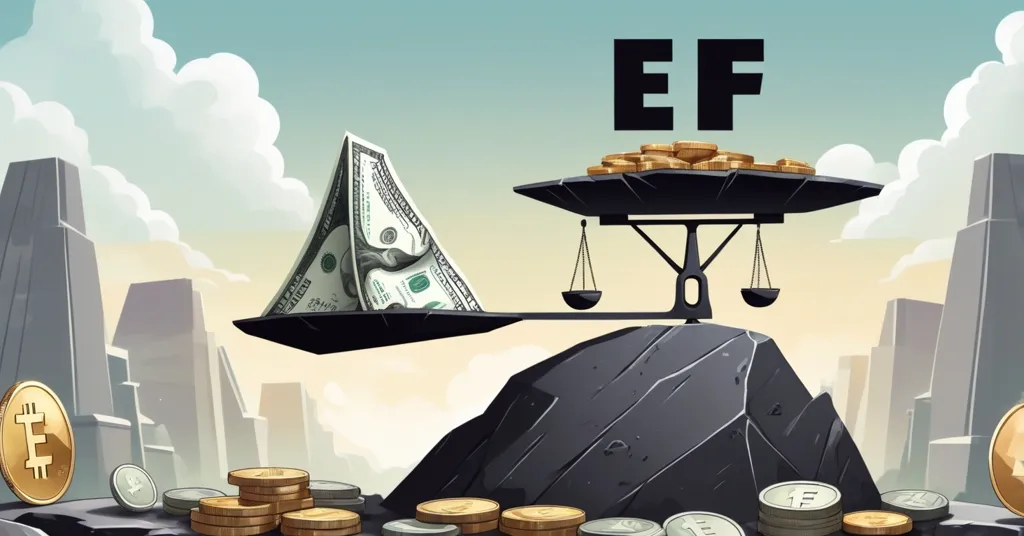SEC Reviews BlackRock’s Ethereum ETF Proposal with In-Kind Redemptions

SEC Acknowledges BlackRock’s In-Kind Redemption Proposal for Ethereum ETF
Could BlackRock’s proposed Ethereum ETF change the game for crypto investors? The U.S. Securities and Exchange Commission (SEC) has taken a significant step by acknowledging BlackRock’s proposal for in-kind redemptions in its spot Ethereum ETF, sparking optimism and signaling a potential shift in the regulatory landscape.
- SEC reviewing BlackRock’s in-kind redemption proposal for Ethereum ETF
- In-kind redemptions favored for efficiency and cost-effectiveness
- Approval could enhance operational efficiency and promote broader adoption
An Exchange-Traded Fund (ETF) is a type of investment vehicle that tracks an asset or a basket of assets, like the price of Ethereum. In-kind redemptions refer to a process where ETF issuers can deliver the actual asset (in this case, ETH) instead of cash when investors redeem shares. This method is favored for its efficiency and cost-effectiveness. Only authorized participants, typically large financial institutions, can execute these redemptions, streamlining operations and potentially reducing costs for investors.
BlackRock, a titan in the asset management world, submitted the request for in-kind redemptions on May 13, aligning with a similar delay for its Bitcoin ETF. This move suggests a strategic push towards more efficient crypto investment vehicles. Historically, the SEC has been cautious about in-kind redemptions, mandating their removal from both Bitcoin and Ethereum ETF filings in December 2023. However, the recent success of BlackRock’s Bitcoin ETF, which has amassed over $52 billion in assets as of January 9, 2025, and played a role in driving Bitcoin’s price to new heights, may be influencing a shift in the SEC’s stance.
Beyond regulatory considerations, political changes could also play a role in the approval of crypto ETFs. The departure of former SEC Chair Gary Gensler and the incoming Trump administration’s anticipated crypto-friendly policies could tip the scales in favor of more progressive regulatory approaches. This shift might pave the way for approvals of additional crypto ETFs, including those for XRP, Solana, Litecoin, and Hedera.
SEC Commissioner Hester Peirce, a long-time advocate for cryptocurrencies, has expressed openness to revisiting the in-kind model. As she stated:
“Commissioner Hester Peirce, a long-time crypto advocate, has expressed openness to revisiting the in-kind model following the exit of former SEC Chair Gary Gensler. She emphasized the need for flexible product design that prioritizes investor utility and market efficiency.”
Peirce’s support could be a crucial factor in the SEC’s decision-making process. Her advocacy for flexible product design highlights the potential benefits of in-kind redemptions for enhancing investor mechanisms and market efficiency.
The potential approval of in-kind redemptions for BlackRock’s Ethereum ETF could have far-reaching effects. It could not only improve operational efficiency but also promote broader institutional adoption of crypto ETFs in the U.S. With Anchorage Digital now included as an additional custodian alongside Coinbase, the operational and security aspects of the proposed ETF could be further strengthened. Anchorage Digital’s reputation as a secure and reliable custodian adds credibility to BlackRock’s proposal.
The market’s optimism around Ethereum is palpable, with the lowest supply on exchanges and a recent price surge. If the SEC approves the Ethereum ETF with in-kind redemptions, it could fuel further growth, drawing parallels with the impact of Bitcoin ETFs on the market. However, while in-kind redemptions promise efficiency, critics warn of potential liquidity issues and increased complexity for retail investors. It’s essential to weigh these risks against the potential benefits.
As we navigate this evolving landscape, it’s clear that the potential approval of in-kind redemptions could be a game-changer for the crypto industry. But let’s not get too starry-eyed; the SEC’s review is just that—a review. The road to approval is still fraught with regulatory hurdles, and the promise of efficiency must be balanced against the inherent challenges of financial innovation.
Online discussions about BlackRock’s Ethereum ETF in-kind redemptions have been active, with users sharing their insights on platforms like Reddit.
For those interested in the potential benefits of in-kind redemptions for Ethereum ETFs, Quora offers a platform for further exploration.
Key Questions and Takeaways
- What is an in-kind redemption?
An in-kind redemption is a process where ETF issuers deliver the actual asset (in this case, ETH) instead of cash when investors redeem shares, enhancing efficiency and cost-effectiveness.
- Why is the SEC’s acknowledgment of BlackRock’s proposal significant?
It indicates that the SEC is reviewing the proposal, which could lead to more efficient and cost-effective Ethereum ETFs, potentially paving the way for broader institutional crypto adoption.
- How does the success of BlackRock’s Bitcoin ETF influence the SEC’s stance on Ethereum ETFs?
The success of BlackRock’s Bitcoin ETF, with substantial inflows and market traction, may encourage the SEC to consider similar models for Ethereum ETFs, reflecting a potential shift in regulatory approach.
- What role does SEC Commissioner Hester Peirce play in this context?
Hester Peirce supports revisiting the in-kind redemption model, emphasizing the importance of flexible product design for investor utility and market efficiency, which could influence the SEC’s decisions.
- What are the potential benefits of in-kind redemptions for investors?
In-kind redemptions can enhance operational efficiency and potentially reduce costs, providing better investor mechanisms and promoting broader institutional adoption of crypto ETFs.



